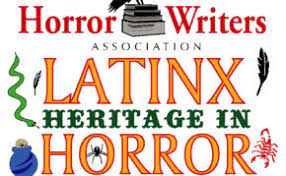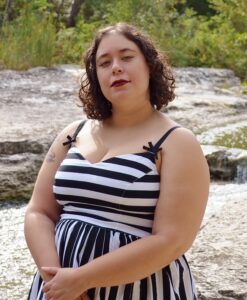Latinx Heritage in Horror: Interview with Leticia Urieta

Leticia Urieta (she/her/hers) is a Tejana writer from Austin, TX. She is a teaching artist in the greater Austin community and the Program Director of Austin Bat Cave, a literary community serving students in the Austin area, as well as the co-director of Barrio Writers Austin and Pflugerville, a free creative writing program for youth. Leticia is also a freelance writer. She is a graduate of Agnes Scott College and holds an MFA in Fiction writing from Texas State University. Her work appears or is forthcoming in Chicon Street Poets, Lumina, The Offing, Kweli Journal, Medium, Electric Lit and others. Her chapbook, The Monster was published in 2018 from LibroMobile Press. Her hybrid collection, Las Criaturas, was a finalist for the Sergio Troncoso Award for Best First Book of Fiction 2022 from the Texas Institute of Letters, and is out now from FlowerSong Press.

Photo Credit to Ramiro Urieta
What inspired you to start writing?
I come from a family of storytellers. My maternal grandfather was a great oral storyteller in our family and in his work as a state officer for the Texas Future Farmers of America. My paternal grandmother was an unpublished poet who shared her poems, handwritten and written on typing paper, before she died and gave me poetry collections by Federico Garcia Lorca and Pablo Neruda, encouraging me to write bilingually. My father was a musician and is a visual artist, and my mom is a big reader and public speaker, so I think it was affirmed for me from an early age that words and self-expression were vital tools to being in and succeeding in the world. I struggled with literacy as a child, but writing my own silly little nature poems and then, when I could read more fluently, reading widely, meant that I felt the draw to write stories for myself, and I’ve been doing it ever since.
What was it about the horror genre that drew you to it?
As a particularly sensitive child, I was scared and anxious a lot of the time, but I often felt myself seeking out these feelings of fear through the books I read, such as the Goosebumps and Fear Street series by R.L. Stine, the Alvin Schwartz Scary Stories to Tell in the Dark Series and watching Are Your Afraid of the Dark? which I watched with my grandma Ines on Saturdays, a show we shared a love of for no reason other than it was fun to be creeped out. Then, as I was exposed to movies like Gremlins and the It miniseries (both of which gave me nightmares for months), I realized that one could grow to crave fear, even seek it out, because it was something that one had control over how they experienced that fear, even for a brief moment in time.
I didn’t begin writing horror stories until I was an adult, mainly because my college creative writing programs did not treat horror and speculative work as serious literature outside of studying the Gothic texts like Dracula and Frankenstein, which I loved most. It wasn’t until I was halfway through my MFA program and was given a copy of The Best American Science Fiction and Fantasy and read Carmen Maria Machado’s “Help Me Follow My Sister Into the Land of the Dead” that I really understood how I could dig into my own weird imagination and write about the absurdity and strangeness of my experiences.
Do you make a conscious effort to include LatinX characters and themes in your writing and if so, what do you want to portray?
I think that all storytellers bring their experiences, preoccupations, interests and multifaceted selves to our stories, as well as our relationships to cultures, regions, race and ethnicity as well as our intersections with privilege and power. Some of my work speaks to my experiences and relationships with Mexican, Mexican American or Tejana communities, both their day to day lives and the ways in which they are othered and marginalized by the culture of the United States. But I also think that there isn’t a homogenous “Latinx experience,” and so instead much of my work focuses more on the ways in which my cultures intersect with my gender and experiences living in a chronically ill body. Ultimately, my stories portray people whose pain, needs and full selves go unacknowledged and what violence they may enact in order to be affirmed, or at least feared.
What has writing horror taught you about the world and yourself?
Horror has always been a place for me where fear is acknowledged and normalized. While others want to ignore valid, real experiences and fears that people face, the horror genre is unflinching, which I find really validating and a space to explore the nature of these fears and how they affect us, especially for people who are marginalized and whose experiences are often overlooked or erased.
How have you seen the horror genre change over the years? And how do you think it will continue to evolve?
The last ten years have shown the ongoing and growing appetite for horror novels, short stories, anthologies, poetry and comics that are moving beyond the same prolific writers who have dominated the horror fiction market such as Steven King and Clive Barker. Horror stories exploring any and all horror subgenres are getting more attention and horror imprints of larger presses are gaining traction in acquiring titles by more diverse authors. I love that there are more horror stories in middle grade and young adult markets for all the creepy kids out there that love being scared. I love that there are more witchy horror stories, more folkloric horror stories and more horror by disabled writers and folks writing about the horrors of the human body.
I hope that there will be even more space for these kinds of stories and that there will be new horror subgenres cropping up that never existed before until someone thought to write a story about them. Living through the rise of fascism in the US, an ongoing global pandemic and climate crises, I think it is vital to provide more space for a diverse array of horror creators to express and affirm these fears in a way that affirms our humanity and spurs action. I would also love to see more opportunities for youth creators and up and coming storytellers to give us new nightmares.
How do you feel the LatinX community has been represented thus far in the genre and what hopes do you have for representation in the genre going forward?
I feel like I am still discovering Latinx authors and creators in the genre. I think like a lot of publishing, it is dominated a bit more by Mexican and Mexican American authors, and even though I am Mexican American, I would love to see representation in horror from across Latin America, especially from Caribbean writers. I think we see that more now in film, and in works by Gabino Iglesias, Cynthia Pelayo and Lilliam Rivera. It’s also great to see more women from Latin America whose works are being translated and made accessible to audiences in the US like Agustina Bazterrica, and I hope that we see more of that too. I also hope that more Latinx writers and creators who are ill and/or disabled can have more outlets to tell their stories in horror, as I think that will be especially necessary during an ongoing global pandemic when many people are becoming newly disabled in Black and Latinx communities.
Who are some of your favorite LatinX characters in horror?
Michelle Rodriguez as Rain in Resident Evil, Melissa Barrera as Sam Carpenter in Scream IV, Jennifer Lopez as Catherine Deane in The Cell, Angélica Celaya as Zed in the NBC Constantine series, the entire teen friend group in Vampires vs. The Bronx, the poet in the novel Dreaming of You by Melissa Lozada-Oliva, and El in The Low Low Woods by Carmen Maria Machado are just a few of my favorite characters from horror media, but I hope to add more to this list as I get through my never-ending to be read and watched list.
Who are some LatinX horror authors you recommend our audience check out?
Castro, Carmen Maria Machado, Rios de la Luz, Zoraida Cordova, Gerardo Sámano Córdova, Vincent Tirado are some of the folks whose writing I am most excited to read and share.
What is one piece of advice you would give horror authors today?
Horror is an expansive genre with many different subgenres that encompass so many different fears and experiences, from haunted houses to the trauma of illness to cosmic horror. Don’t be afraid to get weird and explore what scares you, even if other people have written about that subject before. Only you can articulate that fear, that creepy turn, that tender human moment in your unique voice.
And to the LatinX writers out there who are just getting started, what advice would you give them?
Write the stories that feel the most truthful to you, because you don’t know how your story will resonate with someone.



